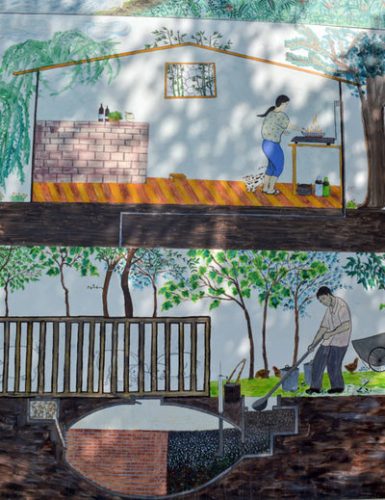
“I think if you’re going to be working on environmental issues, you need to have a cursory understanding of every region of the world.” This is the ambition of Nick Clarke, a Luce Scholar working at a biogas startup in Kunming, Southwest China. When I meet him in late September, the confident, clean-cut 26 year old was in his third month of Chinese language study and his second week of contract meetings with local suppliers and clients. The drive behind the project is an American organization called RIPE energy (see fuelcity.org). The startup is using the project as a pilot to establish and test their model of community-oriented biogas commercialization, which they say will “reduce emissions while generating … organic fertilizer, energy and capital.”
Biogas is methane collected from air-free digestion of natural waste. The technology has myriad social, environmental and public health benefits: Biogas emits one-third the CO2 equivalent of conventional methane reserves (natural gas) in China, where fracking is uncommon, and it provides a way of hygenically repurposing human and animal waste, giving it the potential to significantly reduce the spread of disease in developing areas. Despite its advantages, though, it has until recently been unable to compete commercially with more conventional sources.
Historically, and especially in the context of America’s fracking boom, biogas initiatives have been stymied by high labor and maintenance costs. But China’s relative lack of conventional methane reserves has driven consistently high prices and made other methane sources viable. In the 1970s seven million household-scale biogas reactors spread across the country after their inclusion in the National Economy Program. By 2007 their total had grown to 28 million. More recently, the state gas company’s plans to import liquefied natural gas (LNG) have sparked international controversy.
Despite playing a significant role in rural household heating and cooking, commercial biogas has never been widespread in China. According to the pilot study completed last year by RIPE energy co-founder and CEO Ben Underwood, biogas is on the cusp of commercial viability in China. Partnering with Yunnan Normal University Biogas Engineering Research Center and using food waste from seven local universities, project leaders aim to soon begin supplying compressed natural gas to the city’s bus system and selling fertilizer (the process’ only byproduct) to local farmers. Under current government subsidies, their biogas is also competitive in the energy generation market.
As biogas technology continues to grow into more conventional energy markets and the markets themselves adjust to the reality of climate change, biogas may present an increasingly attractive alternative to conventional sources. China, long acquainted with the technology, lacking major natural gas reserves, and in search of low-pollution energy sources, may be the perfect market to foster yet another clean energy industry. — Forrest Watkins